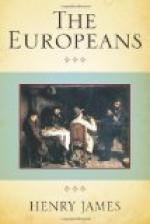“Beautifully!” said Acton. “Especially,” he continued, “when one remembers that you were very imprudent and that she must have been a good deal annoyed.”
“Oh,” cried Clifford, with the indifference of a young man who feels that however he may have failed of felicity in behavior he is extremely just in his impressions, “Eugenia does n’t care for anything!”
Acton hesitated a moment. “Thank you for telling me this,” he said at last. And then, laying his hand on Clifford’s shoulder, he added, “Tell me one thing more: are you by chance a little in love with the Baroness?”
“No, sir!” said Clifford, almost shaking off his hand.
CHAPTER X
The first sunday that followed Robert Acton’s return from Newport witnessed a change in the brilliant weather that had long prevailed. The rain began to fall and the day was cold and dreary. Mr. Wentworth and his daughters put on overshoes and went to church, and Felix Young, without overshoes, went also, holding an umbrella over Gertrude. It is to be feared that, in the whole observance, this was the privilege he most highly valued. The Baroness remained at home; she was in neither a cheerful nor a devotional mood. She had, however, never been, during her residence in the United States, what is called a regular attendant at divine service; and on this particular Sunday morning of which I began with speaking she stood at the window of her little drawing-room, watching the long arm of a rose-tree that was attached to her piazza, but a portion of which had disengaged itself, sway to and fro, shake and gesticulate, against the dusky drizzle of the sky. Every now and then, in a gust of wind, the rose-tree scattered a shower of water-drops against the window-pane; it appeared to have a kind of human movement—a menacing, warning intention. The room was very cold; Madame Munster put on a shawl and walked about. Then she determined to have some fire; and summoning her ancient negress, the contrast of whose polished ebony and whose crimson turban had been at first a source of satisfaction to her, she made arrangements for the production of a crackling flame. This old woman’s name was Azarina. The Baroness had begun by thinking that there would be a savory wildness in her talk, and, for amusement, she had encouraged her to chatter. But Azarina was dry and prim; her conversation was anything but African; she reminded Eugenia of the tiresome old ladies she met in society. She knew, however, how to make a fire; so that after she had laid the logs, Eugenia, who was terribly bored, found a quarter of an hour’s entertainment in sitting and watching them blaze and sputter. She had thought it very likely Robert Acton would come and see her; she had not met him since that infelicitous evening. But the morning waned without his coming; several times she thought she heard his step on the piazza; but it was only a window-shutter shaking in




